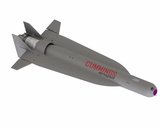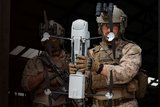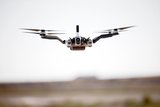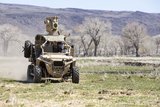UAV programme triumphs at Technology and Innovation Awards 2008
Engineering industry experts from across the UK witnessed Lancaster University, Cranfield University and BAE Systems win two awards at the Technology and Innovation Awards 2008. The awards recognised their collaboration on pioneering Unmanned Air Systems (UAS) programme, ASTRAEA.
Hosted by The Engineer magazine at the Royal Society in London, the team won the Special Award for Outstanding Achievement and also triumphed in the Aerospace and Defence Award category for their work in developing a sense and avoid capability for Unmanned Aerial Vehicles (UAVs) designed for civilian use.
The ASTRAEA programme, through which the technologies were developed, is a £32m collaboration which aims to open up UK airspace to the unrestricted use of UAVs.
The programme aims to demonstrate that UAVs can operate with equivalent safety and with the same level of transparency as manned aircraft. The programme includes research into ‘sense and avoid' technology designed to autonomously recognise potential airborne collisions and take evasive action.
In manned flight, traffic collision avoidance systems currently rely on a pilot, for example recommending altitude changes in order to avert a potential collision. As well as use on unmanned aircraft therefore, the groundbreaking research undertaken through ASTRAEA may eventually also provide backup to support routine operations in all classes of aircraft.
On this aspect of the ASTRAEA programme, the team used a BAE Systems software development environment to develop, integrate and evaluate their sense and avoid research. The advanced facilities allowed the team to test the UAV capabilities within a synthetic environment that accurately matched the environment of a real aircraft.
Darren Ansell, Mission Systems Research Team Leader at BAE Systems, said: "Using synthetic environments we were able to create the environment of a real UAV in flight, which enabled us to test and subsequently develop effective ‘sense and avoid' system capabilities. We're delighted to have won these awards jointly with Lancaster and Cranfield University as it reiterates how important collaboration in the project is and the vital role that this work plays in contributing to the ASTRAEA programme as a whole."
Dr Plamen Angelov, Principal Investigator on the ASTRAEA project at Lancaster University said: "These awards reinforce the recognition of our team's advanced research into intelligent and autonomous systems and its potential usefulness. We believe the North West is well placed to benefit from the potential growth of the UAV market through Lancaster University and companies like BAE Systems at Warton."
Lancaster University was awarded £225,000 as part of the first three-year phase of the ASTRAEA programme.
About ASTRAEA
ASTRAEA is a pioneering £32 million aerospace programme which is investigating key technological and regulatory issues related to opening up non-segregated airspace to unmanned autonomous aircraft. The programme last three years and represents a cross section of interested parties, involving government, industry, academia and regional bodies.
More from Uncrewed Vehicles
-
![Cummings Aerospace showcases Hellhound loitering munition designed for US Army’s LASSO programme (video)]()
Cummings Aerospace showcases Hellhound loitering munition designed for US Army’s LASSO programme (video)
Cummings Aerospace presented its turbojet-powered Hellhound loitering munition at SOF Week 2025, offering a man-portable solution aligned with the US Army’s LASSO requirements.
-
![SOF Week 2025: PDW unveils attritable FPV drone for SOF operations at scale]()
SOF Week 2025: PDW unveils attritable FPV drone for SOF operations at scale
PDW has revealed its Attritable Multirotor First Person View drone at SOF Week 2025, offering special operations forces a low-cost, rapidly deployable platform for strike and ISR missions, inspired by battlefield lessons from Ukraine.
-
![SOF Week 2025: Teledyne FLIR white paper provides guidance on reusable loitering munitions]()
SOF Week 2025: Teledyne FLIR white paper provides guidance on reusable loitering munitions
Teledyne FLIR is highlighting the emerging requirements for 'recoverable and re-usable' loitering munitions across the contemporary operating environment during this week’s SOF Week conference in Tampa, Florida.
-
![SOF Week 2025: Kraken Technology group debuts K3 Scout USV in North America]()
SOF Week 2025: Kraken Technology group debuts K3 Scout USV in North America
High-performance maritime industry player Kraken Technology Group, based in the UK, has used the SOF Week conference in Tampa, Florida this week to debut its K3 Scout uncrewed surface vessel (USV) to the North American market.
-
![Palladyne AI and Red Cat to demonstrate capabilities for autonomous drone swarms to the US military]()
Palladyne AI and Red Cat to demonstrate capabilities for autonomous drone swarms to the US military
Red Cat and Palladyne AI recently conducted a cross-platform collaborative flight involving three diverse heterogeneous drones.
-
Jammer resistant drone designs spark search for countermeasures
The Russia-Ukraine conflict has driven another stage of evolution for drones and the counter measures to defend against them.

























